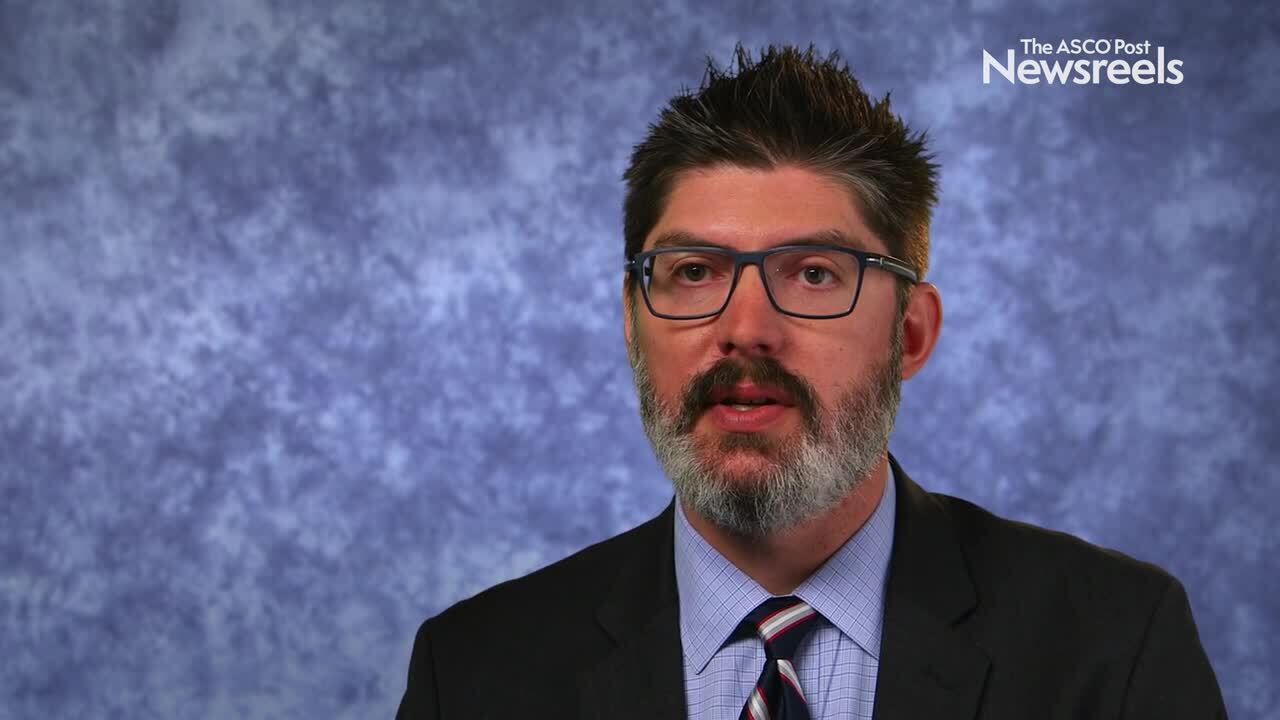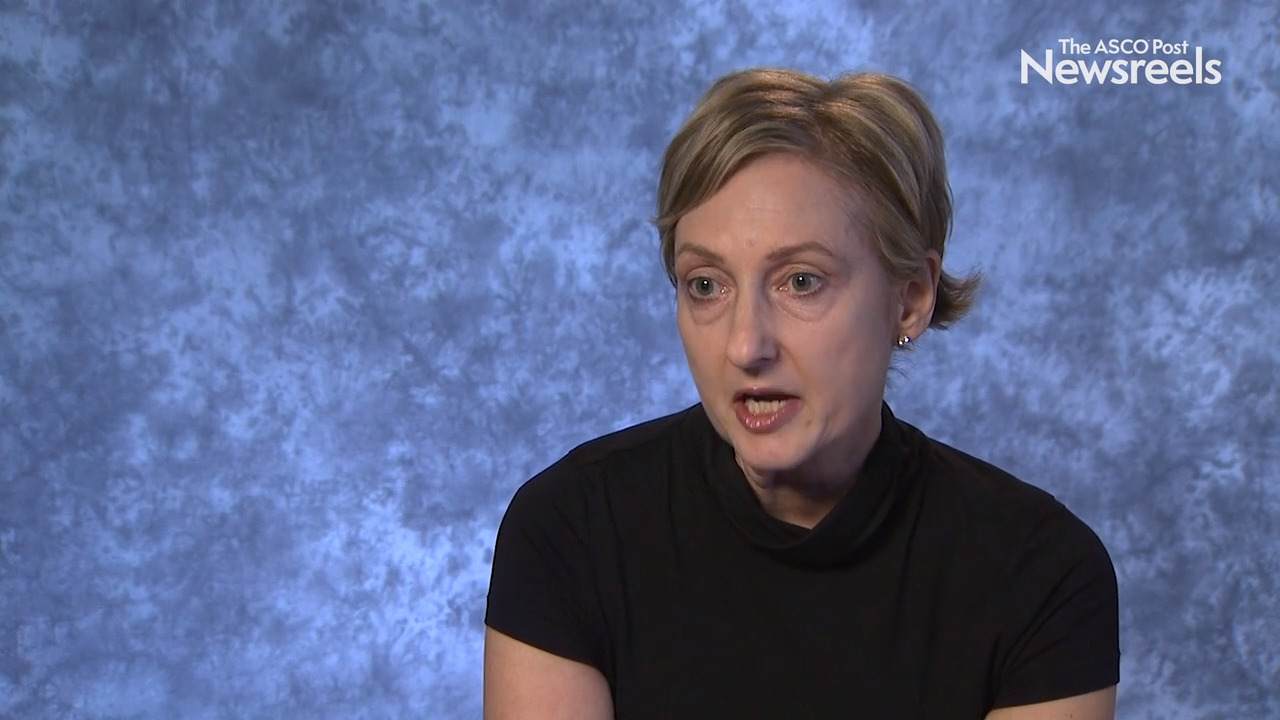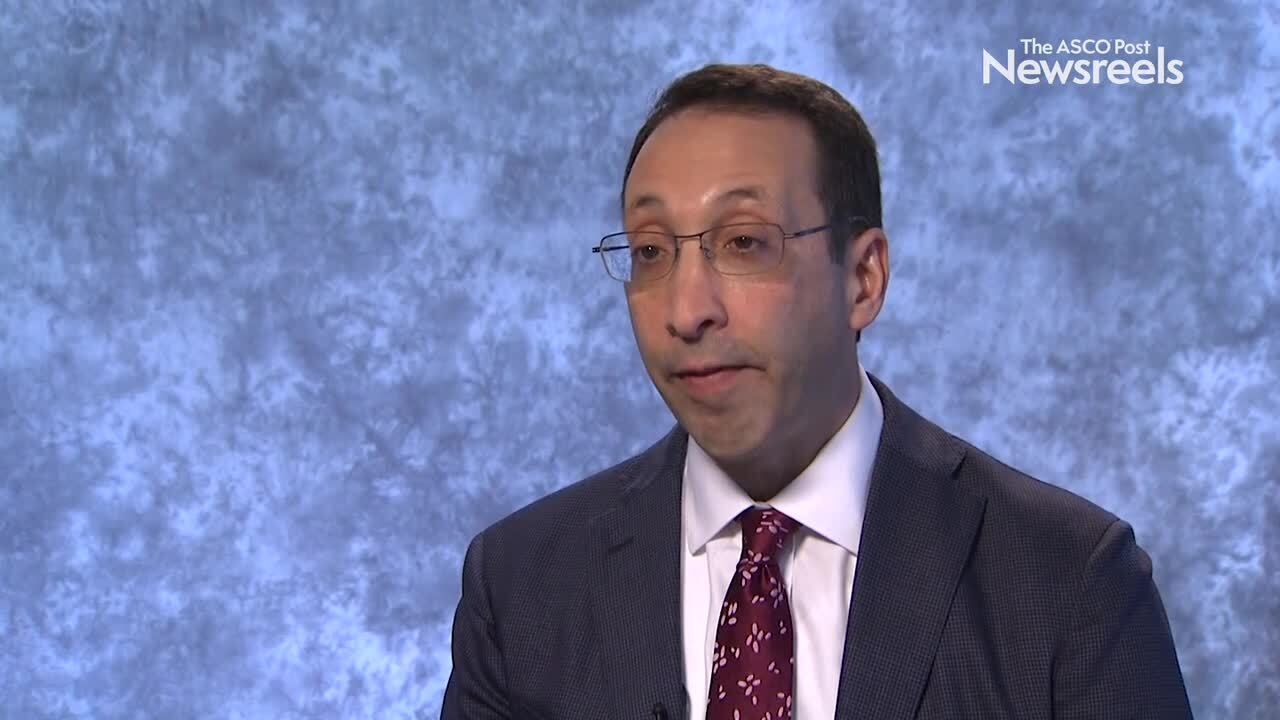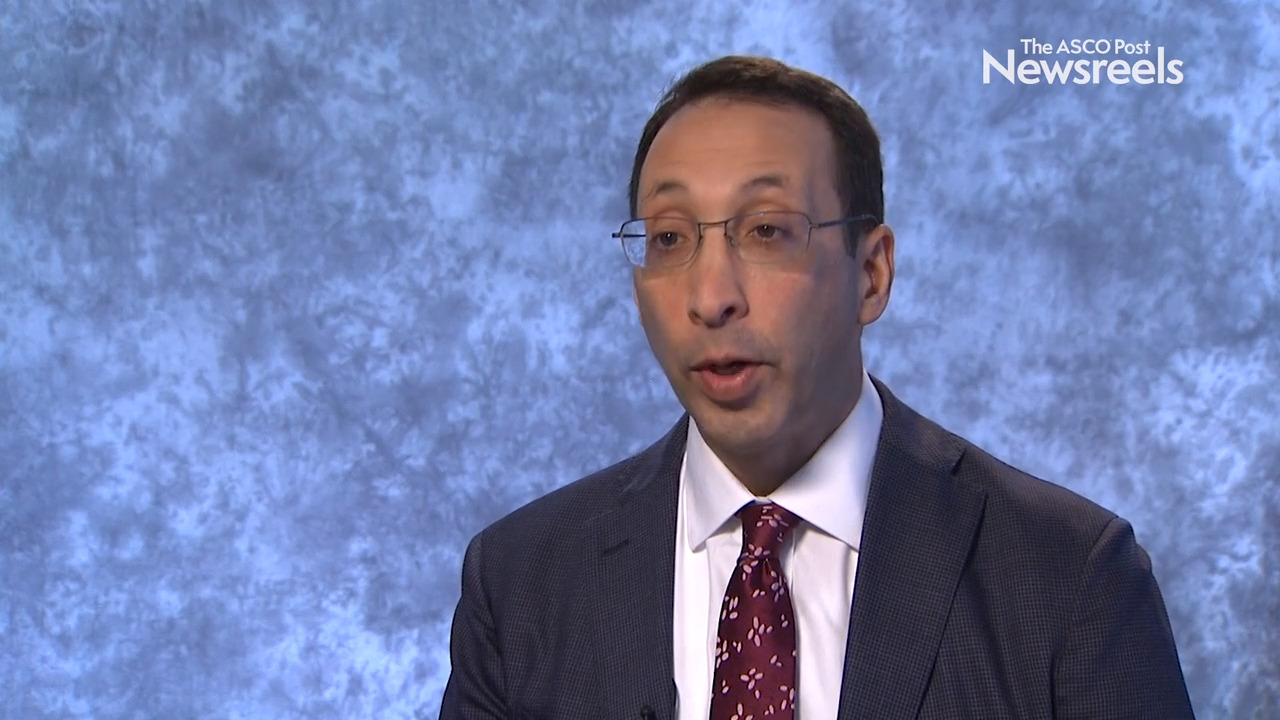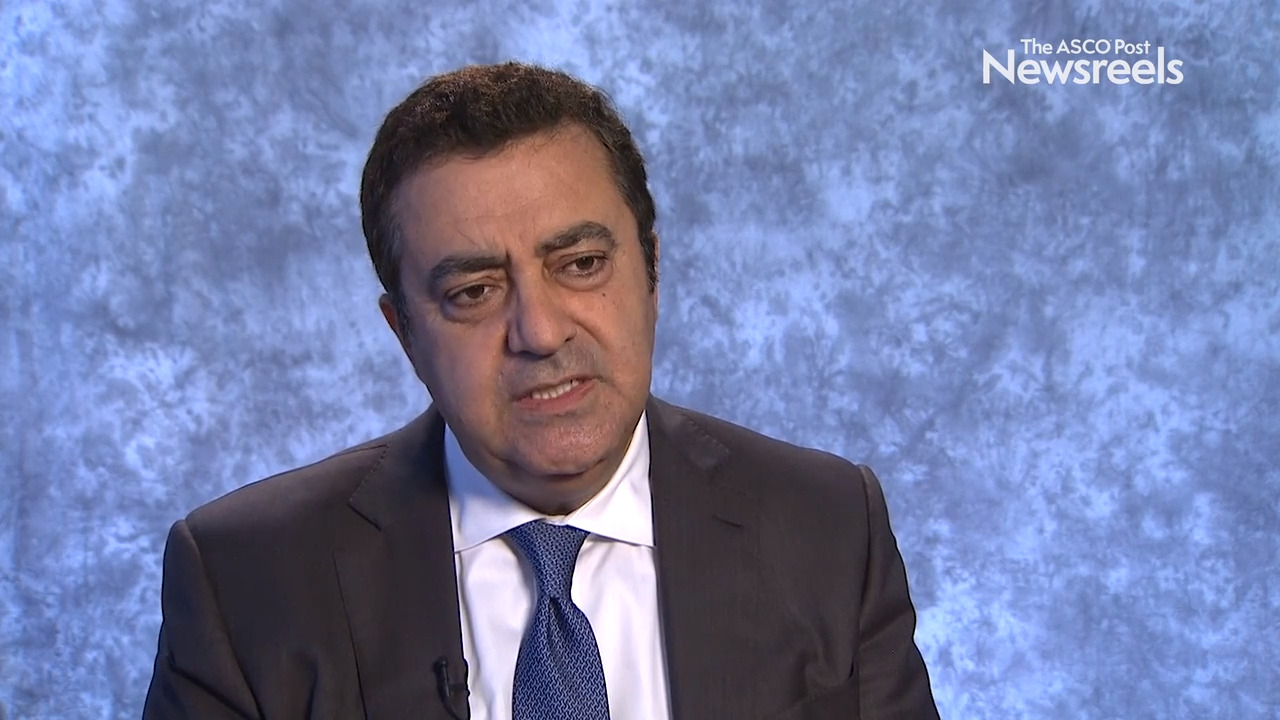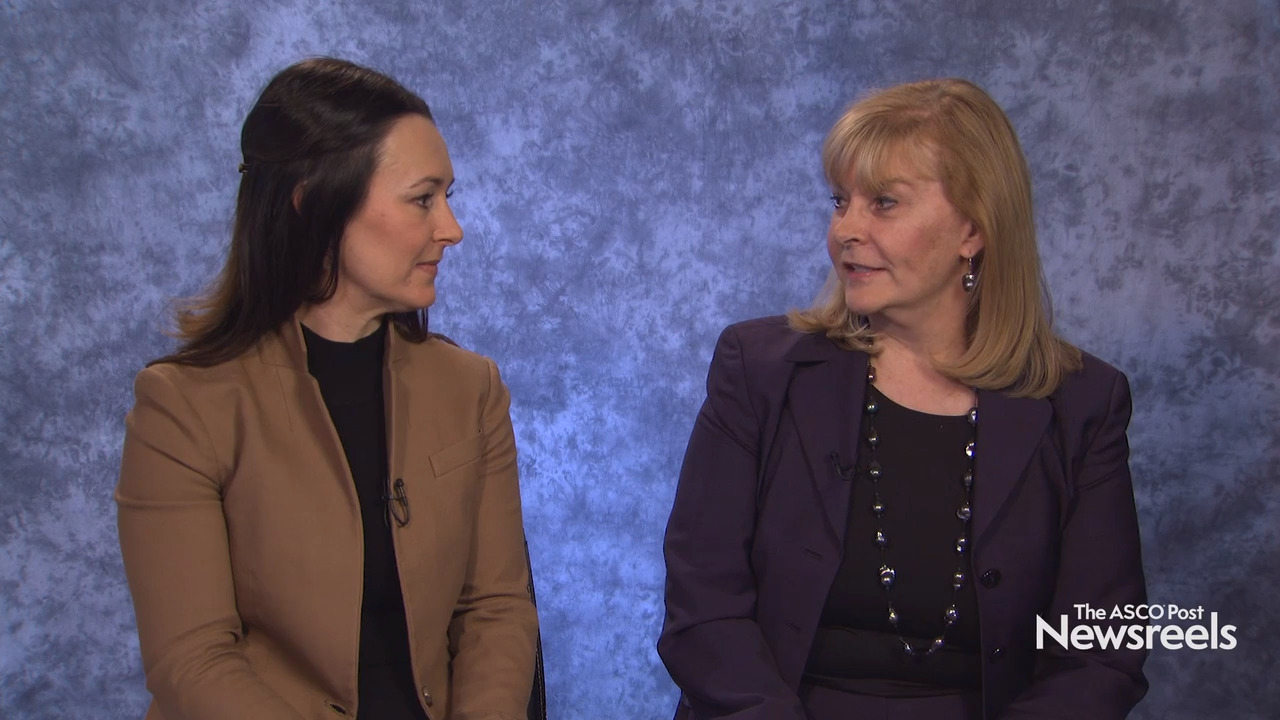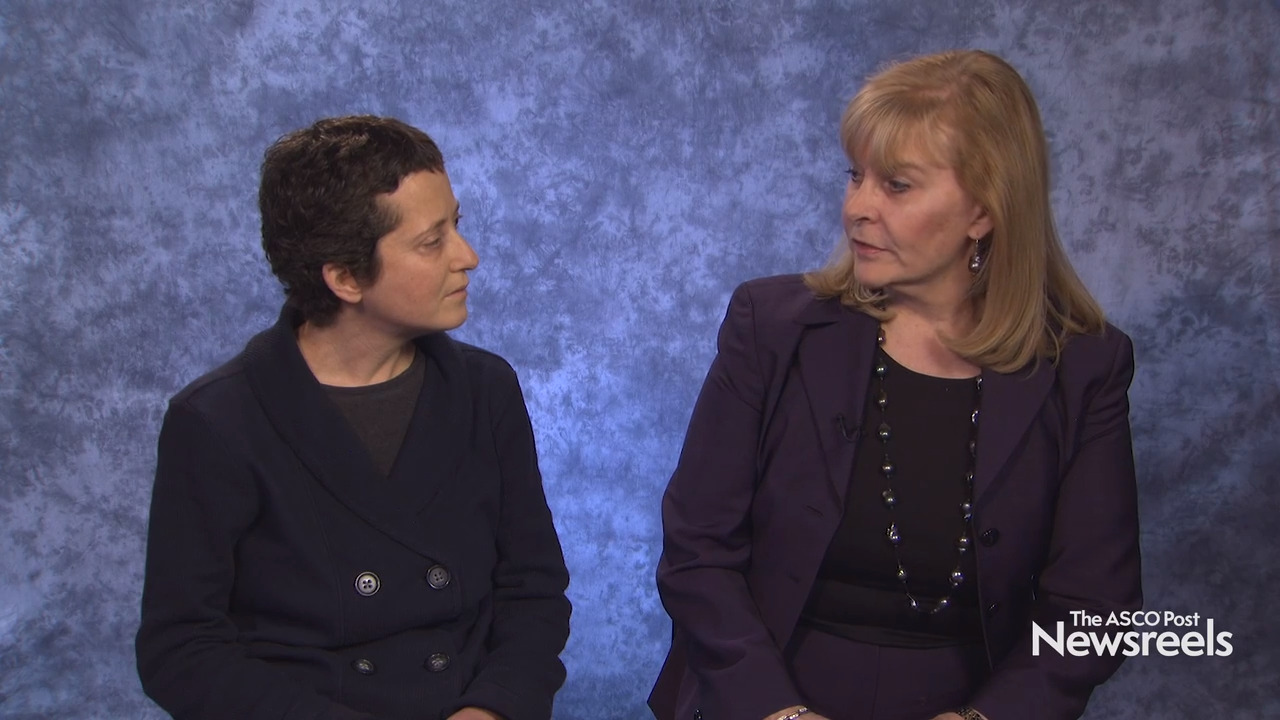Expert Point of View: Louis M. Weiner, MD, and Thomas Habermann, MD
“THIS REPRESENTS the fruits of years of research. Umbralisib is a more potent and selective PI3K inhibitor targeted to the delta isoform. This provides a more precise target for drugs that block that protein, and it more effectively disables signaling. The B cell is central to the survival of...
Umbralisib: Potential Option for Relapsed or Refractory Marginal Zone Lymphoma
UMBRALISIB—an investigational PI3K-delta inhibitor—produced impressive results as monotherapy in patients with relapsed or refractory marginal zone lymphoma, according to an interim analysis of the phase II UNITY-NHL trial presented at the 2019 American Association for Cancer Research (AACR) Annual ...
ESTRO 38: Radiotherapy After ABVD May Improve Survival in Advanced Hodgkin Lymphoma
Patients with advanced Hodgkin lymphoma with bulky lesions at the time of diagnosis may benefit from radiotherapy after chemotherapy, according to late-breaking results presented by Ricardi et al at ESTRO 38, the annual congress of the European Society for Radiotherapy & Oncology...
Risk Model for Disease Progression in Asymptomatic Waldenström’s Macroglobulinemia
In a study reported in the Journal of Clinical Oncology, Bustoros et al developed a model for predicting risk of progression from asymptomatic Waldenström’s macroglobulinemia to symptomatic disease requiring treatment. The study involved 439 patients with asymptomatic...
Front-Line Dose-Adjusted EPOCH-R vs R-CHOP in Diffuse Large B-Cell Lymphoma
As reported in the Journal of Clinical Oncology by Bartlett et al, the phase III intergroup Alliance/CALGB 50303 trial showed front-line DA-EPOCH-R (dose-adjusted etoposide, prednisone, vincristine, cyclophosphamide, doxorubicin, and rituximab) did not improve outcomes vs standard R-CHOP...
Addition of Bortezomib to R-CHOP in DLBCL Subtypes Identified With Gene-Expression Profiling
In the phase III REMoDL-B trial reported in The Lancet Oncology, Davies et al found that the addition of bortezomib to standard R-CHOP (rituximab, cyclophosphamide, doxorubicin, vincristine, and prednisolone) did not improve progression-free survival subtypes of diffuse large B-cell lymphoma...
Addition of Ibrutinib to R-CHOP in Non–Germinal Center B-Cell DLBCL
In the phase III PHOENIX trial reported in the Journal of Clinical Oncology, Younes et al found that the addition of ibrutinib to R-CHOP (rituximab plus cyclophosphamide, doxorubicin, vincristine, and prednisone) did not improve outcomes in patients with untreated non–germinal center B-cell...
AUGMENT: Addition of Lenalidomide to Rituximab in Relapsed or Refractory Indolent Lymphoma
In the phase III AUGMENT trial reported in the Journal of Clinical Oncology, Leonard et al found that the addition of lenalidomide to rituximab significantly prolonged progression-free survival in patients with relapsed or refractory indolent lymphoma. Study Details The double-blind trial...
Frederick L. Locke, MD, on Innovative CAR-T Cell Therapies: The Patient Experience
Frederick L. Locke, MD, of the H. Lee Moffitt Cancer Center and Research Institute, discusses recent approvals of chimeric antigen receptor T-cell therapies in leukemia and lymphoma, and how clinicians are using infrastructure, navigation, and early referrals to maximize response and minimize toxicity.
CAR T-Cell Therapy for DLBCL: At the Crossroads of Hype and Reality
In the 20-plus years I have spent in hematologic oncology, I have been fortunate to have a ringside seat to watch “game-changing” advances come into our field—all-trans retinoic acid for acute promyelocytic leukemia, tyrosine kinase inhibitors starting with imatinib for chronic myeloid leukemia,...
Tisagenlecleucel Active in Adult Relapsed or Refractory Diffuse Large B-Cell Lymphoma
As reported in The New England Journal of Medicine by Stephen J. Schuster, MD, of Abramson Cancer Center, University of Pennsylvania, and colleagues, the international phase II JULIET trial has shown high response rates with the chimeric antigen receptor (CAR) T-cell therapy tisagenlecleucel in...
Subsequent Primary Neoplasms in Survivors of Adolescent and Young Adult Cancers
In a UK population-based cohort study (Teenage and Young Adult Cancer Survivor Study) reported in The Lancet Oncology, Bright et al found that subsequent primary neoplasms were most common in survivors of adolescent and young adult (AYA) breast, cervical, and testicular cancers, as well as Hodgkin...
Update on Newer Treatments in Non-Hodgkin Lymphomas
AS PART of The ASCO Post’s continued coverage of the 2018 American Society of Hematology (ASH) Annual Meeting & Exposition, here is an update on several different studies on new therapeutics in non-Hodgkin lymphomas (NHLs), including follicular lymphoma, diffuse large B-cell lymphoma (DLBCL), ...
FDA Pipeline: Updates on Treatments for Cervical Cancer, Myelofibrosis, Chemotherapy-Induced Nausea and Vomiting, and More
The FDA recently issued announcements on a Fast Track designation, a Priority Review, two supplemental new drug applications, an investigational new drug application, and a marketing clearance. The agency also released a safety communication on cancer-related surgery. Fast Track Designation for...
First-Line Treatment of Indolent Non-Hodgkin Lymphoma or Mantle Cell Lymphoma With Bendamustine/Rituximab vs R-CHOP or R-CVP
As reported in the Journal of Clinical Oncology by Flinn et al, 5-year follow-up of the phase III BRIGHT trial has shown improved outcomes with first-line bendamustine/rituximab vs R-CHOP (rituximab plus cyclophosphamide, doxorubicin, vincristine, and prednisone) or R-CVP (rituximab plus...
Relapse Risk and Survival With Contemporary Therapy in Young Patients With Hodgkin Lymphoma
In a Nordic Lymphoma Epidemiology Group study reported in the Journal of Clinical Oncology, Biccler et al found that relapse risk and loss in expectation of lifetime were low in young patients receiving contemporary therapy for classical Hodgkin lymphoma. Outcomes were particularly good among...
Update on FDA-Approved CAR T-Cell Products
AXICABTAGENE CILOLEUCEL (also known as CAR19) is an anti-CD19 chimeric antigen receptor (CAR) T-cell product approved by U.S. Food and Drug Administration to treat selected hematologic malignancies.1 To appreciate the clinical trial findings summarized here, from selected abstracts presented at the ...
Update on FDA-Approved CAR T-Cell Products
TISAGENLECLEUCEL IS an anti-CD19 chimeric antigen receptor (CAR) T-cell product approved by U.S. Food and Drug Administration to treat selected hematologic malignancies.1,2 To appreciate the clinical trial findings summarized here, from selected abstracts presented at the 2018 American Society of...
Highlights From the 2018 ASH Annual Meeting & Exposition
TO ADD to our ongoing coverage of the 2018 American Society of Hematology (ASH) Annual Meeting & Exposition, we bring readers of The ASCO Post these summaries of an assortment of interesting studies. They focus on novel therapies under investigation in the treatment of acute lymphoblastic...
FDA Pipeline: Priority Reviews in Solid Tumors and Lymphoma; Plus an sNDA in Acute Myeloid Leukemia
Over the past week, the U.S. Food and Drug Administration (FDA) granted multiple Priority Reviews and accepted a supplemental new drug application: Priority Review for Entrectinib in NTRK Fusion–Positive Solid Tumors and Metastatic, ROS1-Positive NSCLC This week, the FDA accepted new drug...
Cutaneous T-Cell Lymphoma: Can Genetic Polymorphisms Help Select Patients for Treatment With Bexarotene?
Bexarotene is a retinoid approved for the treatment of patients with cutaneous T-cell lymphoma (CTCL) who have not responded to at least one previous treatment regimen. Hypertrigylceridemia is the most frequent adverse event related to treatment with bexarotene in CTCL. Even with prophylactic...
DYNAMO: Duvelisib in Refractory Indolent Non-Hodgkin Lymphoma
In the phase II DYNAMO trial reported in the Journal of Clinical Oncology, Flinn et al found a response rate of nearly 50% with duvelisib, an oral dual inhibitor of phosphoinositide 3-kinase (PI3K)-γ and -δ, in indolent non-Hodgkin lymphoma refractory to rituximab and either...
Alisertib vs Investigator’s Choice in Relapsed or Refractory Peripheral T-Cell Lymphoma
In the phase III Lumiere trial reported in the Journal of Clinical Oncology, O’Connor et al found that the Aurora A kinase inhibitor alisertib did not improve outcomes vs investigator’s choice of single-agent treatment in relapsed or refractory peripheral T-cell lymphoma (PTCL). Study...
Living My Best Life
Five years ago, I was living my dream life. I was under contract as a commentator on Fox News, which necessitated commuting weekly from my home in Los Angeles to New York, and was building a new home in Palm Springs with my partner, Matt Lashey. Not only was my career and personal life going well,...
FDA Approves Ibrutinib in Combination With Obinutuzumab in Treatment-Naive CLL/SLL
ON JANUARY 28, 2019, the U.S. Food and Drug Administration (FDA) approved ibrutinib (Imbruvica), a Bruton’s tyrosine kinase inhibitor, in combination with obinutuzumab in treatment-naive patients with chronic lymphocytic leukemia/small lymphocytic lymphoma (CLL/SLL). This is the first approval of...
FDA Pipeline: Treatments for Tenosynovial Giant Cell Tumor and Pancreatic Cancer, Plus a Statement on Breast Implant–Associated Lymphoma
The U.S. Food and Drug Administration (FDA) recently granted the following designations and applications and also issued a statement: Priority Review for Pexidartinib in Tenosynovial Giant Cell Tumor The FDA has accepted a new drug application (NDA) and granted Priority Review for pexidartinib...
FDA Pipeline: Updates on Treatments in NSCLC and Lymphomas, Plus New Dosimetry Software
The U.S. Food and Drug Administration (FDA) recently granted the following application, designations, and clearance: sBLA for Atezolizumab Plus Chemotherapy for First-Line Treatment of Metastatic, Nonsquamous NSCLC On January 17, the FDA accepted a supplemental biologics license application...
2018 Update of WHO-EORTC Classification of Primary Cutaneous Lymphomas
As reported by Willemze and colleagues in Blood, the World Health Organization (WHO) and the European Organisation for Research and Treatment of Cancer (EORTC) have released a 2018 update of their classification of primary cutaneous lymphomas. As noted by the authors, “Primary cutaneous...
FDA Approves Ibrutinib in Combination With Obinutuzumab in Treatment-Naive CLL/SLL
Today, the U.S. Food and Drug Administration (FDA) approved ibrutinib (Imbruvica), a Bruton's tyrosine kinase inhibitor, in combination with obinutuzumab in treatment-naive patients with chronic lymphocytic leukemia/small lymphocytic lymphoma (CLL/SLL). This is the first approval of a...
Hastening the Development of Novel Therapies for Peripheral T-Cell Lymphomas
Peripheral T-cell lymphomas (PTCLs) make up a small fraction of all non-Hodgkin lymphomas—just 15%—in the United States.1 Although rare in the United States, the incidence of PTCL is common across Asia, the Caribbean, and sub-Saharan Africa. Although the reason for such global variation in PTCL is...
PET-Adapted Treatment in Newly Diagnosed Advanced Hodgkin Lymphoma
In the phase III AHL2011 trial reported in The Lancet Oncology, Casasnovas et al found that positron-emission tomography (PET)-guided treatment produced good outcomes in newly diagnosed advanced Hodgkin lymphoma, allowing de-escalation of induction to ABVD (doxorubicin, bleomycin, vinblastine, and...
Survival With Combined Modality Therapy vs Chemotherapy Alone in Early-Stage Pediatric Hodgkin Lymphoma
In an observational cohort study reported in JAMA Oncology, Jhawar et al found that combined modality therapy (CMT) with chemotherapy followed by radiotherapy was associated with a survival advantage vs chemotherapy alone in early-stage pediatric Hodgkin lymphoma. The authors noted that use of...
Outcomes With AHCT Consolidation in Younger Patients With Mantle Cell Lymphoma in the Rituximab Era
In a retrospective study reported in the Journal of Clinical Oncology, Gerson et al found evidence that autologous hematopoietic cell transplantation (AHCT) consolidation after induction chemotherapy was associated with a progression-free survival benefit in patients with mantle cell lymphoma aged...
Is There a Benefit to Adding Rituximab to Methotrexate-Based Chemotherapy in Primary CNS Lymphoma?
In a phase III trial (HOVON 105/ALLG NHL 24) reported in The Lancet Oncology, Bromberg et al found no significant benefit of the addition of rituximab to high-dose methotrexate-based chemotherapy in patients with newly diagnosed primary central nervous system (CNS) lymphoma. Study Details In the...
Nivolumab in Relapsed or Refractory DLBCL Ineligible for or After Failure of Autologous Transplantation
In a phase II trial reported in the Journal of Clinical Oncology, Ansell et al found that nivolumab was associated with low response rates among patients with relapsed or refractory diffuse large B-cell lymphoma (DLBCL) who were ineligible for or experienced failure of autologous hematopoietic cell ...
Analysis of Cause of Death in Patients With Follicular Lymphoma in the Rituximab Era
In a pooled analysis of French and U.S. follicular lymphoma cohorts reported in the Journal of Clinical Oncology, Sarkozy and colleagues found that lymphoma was the most common cause of death during the first decade of the rituximab era in treatment of the disease. The study involved data from...
High Long-Term Risk of Solid Cancers in Survivors of Childhood Hodgkin Lymphoma
A new study may bolster existing evidence that survivors of childhood Hodgkin lymphoma face an elevated risk of developing various types of solid tumors many years later. The study showed that certain subgroups of patients have an especially high risk. Published by Holmqvist et al in the journal...
Breakthrough Therapy Designation for Brentuximab Vedotin in Front-Line Treatment of Peripheral T-Cell Lymphomas
THE FDA recently granted Breakthrough Therapy designation to brentuximab vedotin (Adcetris) for previously untreated systemic anaplastic large cell lymphoma or other CD30-expressing peripheral T-cell lymphomas (PTCL), including angioimmunoblastic T-cell lymphoma and PTCL not otherwise specified, in ...
ECHELON-2: Brentuximab Vedotin Plus Chemotherapy in CD30-Positive Peripheral T-Cell Lymphoma
As reported by Horwitz et al in The Lancet, the phase III ECHELON-2 trial showed that brentuximab vedotin (Adcetris) plus cyclophosphamide, doxorubicin, and prednisone (CHP) improved progression-free and overall survival vs cyclophosphamide, doxorubicin, vincristine, and prednisone (CHOP) in...
FDA Pipeline: New Priority Reviews, Designations, and Clearances, Plus Statements on Genetic Testing and Class Labeling
The U.S. Food and Drug Administration (FDA) recently issued the following new approvals and designations: Priority Review for Atezolizumab in Combination With Chemotherapy for the Initial Treatment of Extensive-Stage SCLC The FDA accepted a supplemental biologics license application...
Duvelisib for Relapsed or Refractory CLL/SLL and for Relapsed or Refractory Follicular Lymphoma
In the Clinic provides overviews of novel oncology agents, addressing indications, mechanisms of action, administration recommendations, safety profiles, and other essential information needed for the appropriate clinical use of these drugs. On September 24, 2018, duvelisib (Copiktra) was granted...
Expert Point of View: Laurie H. Sehn, MD
LAURIE H. SEHN, MD, Chair, Lymphoma Tumour Group, BC Cancer Agency, Vancouver, British Columbia, Canada, said these results are not unexpected and support de-escalation in selected patients. “The FLYER trial evaluates treatment with four cycles compared with six cycles of cyclophosphamide,...
De-escalation of Chemotherapy in Favorable-Risk Diffuse Large B-Cell Lymphoma
THE REGIMEN of four cycles of rituximab (Rituxan)/cyclophosphamide, doxorubicin, vincristine, prednisone (R-CHOP) plus two cycles of rituximab was noninferior to that of six cycles of R-CHOP in younger patients with favorable-risk diffuse large B-cell lymphoma (DLBCL), according to the results of...
Laurie H. Sehn, MD, MPH, on DLBCL: Trial Results on the Prognostic Significance of MYC
Laurie H. Sehn, MD, MPH, of the British Columbia Cancer Centre for Lymphoid Cancer, discusses a study by the Lunenburg Lymphoma Biomarker Consortium that confirmed previous reports on the negative prognostic impact of an underlying MYC-translocation for both progression-free and overall survival in diffuse large B-cell lymphoma (Abstract 344).
ASH 2018: CAR.CD30 T-Cell Therapy in Relapsed or Refractory CD30-Positive Lymphomas
At the 2018 American Society of Hematology (ASH) Annual Meeting & Exposition, Grover et al presented preliminary results from a clinical study of an investigational cellular immunotherapy for Hodgkin lymphoma and non-Hodgkin lymphoma expressing the CD30 protein marker (Abstract 681). Data...
Steven M. Horwitz, MD, on PTCL: Results From the ECHELON-2 Trial
Steven M. Horwitz, MD, of Memorial Sloan Kettering Cancer Center, discusses phase III findings on brentuximab vedotin and CHP vs CHOP in the front-line treatment of patients with CD30-positive peripheral T-cell lymphomas (Abstract 997).
Steven M. Horwitz, MD, on PTCL and CTCL: Trial Results on Cerdulatinib
Steven M. Horwitz, MD, of Memorial Sloan Kettering Cancer Center, discusses phase IIa study findings on the novel SYK/JAK inhibitor cerdulatinib for relapsed/refractory peripheral T-cell lymphoma and cutaneous T-cell lymphoma (Abstract 1001).
Anas Younes, MD, on DLBCL: Phase III Trial Results
Anas Younes, MD, of Memorial Sloan Kettering Cancer Center, discusses trial findings on ibrutinib plus rituximab, cyclophosphamide, doxorubicin, vincristine, and prednisone in people with previously untreated non–germinal center B-cell–like diffuse large B-cell lymphoma (Abstract 784).
Julie Vose, MD, MBA, and Loretta J. Nastoupil, MD, on Large B-Cell Lymphoma: Real-World Experience With CAR T-Cell Therapy
Julie Vose, MD, MBA, of the University of Nebraska Medical Center, and Loretta J. Nastoupil, MD, of The University of Texas MD Anderson Cancer Center, discuss findings from a multicenter study of axicabtagene ciloleucel CD19 CAR T-cell therapy for relapsed or refractory aggressive B-cell lymphoma when used as a standard of care (Abstract 91).
Julie Vose, MD, MBA, and Merav Bar, MD, on CAR T-Cell Therapy: Late Effects of CD19-Targeted Treatment
Julie Vose, MD, MBA, of the University of Nebraska Medical Center, and Merav Bar, MD, of the Fred Hutchinson Cancer Research Center, discuss study findings on the long-term effects in people with relapsed or refractory non-Hodgkin lymphoma and chronic lymphocytic leukemia who received CD19-targeted CAR T-cell infusions, survived more than a year, and had at least 1 year of follow-up data after their first treatment (Abstract 223).
